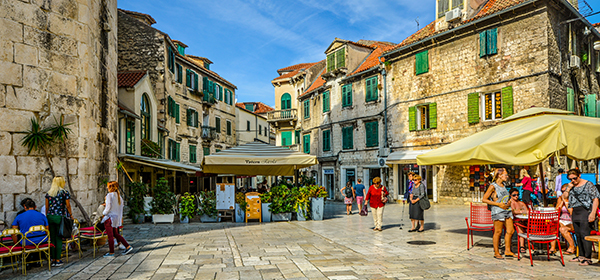Retire in Split Guide
Summary: If Split is on your retirement radar, our detailed Retire in Split Guide is your go-to resource. Delve into the crucial aspects of life here, including living costs, climate, housing options, healthcare services, and residency procedures. We also explore the city's social dynamics, volunteering scenes, transportation, and how walkable its neighborhoods are.

Split, is a popular destination for international retirees due to its rich history, stunning natural beauty, and relaxed Mediterranean lifestyle. The city offers a unique blend of ancient and modern, with Roman ruins sitting alongside vibrant cafes and markets. However, retiring in a foreign country can present its own set of challenges, from language barriers to navigating a new healthcare system. This article will explore the best aspects of retiring in Split, as well as some of the potential difficulties.
Cost of Living
One of the main attractions for retirees in Split is the relatively low cost of living. While prices can vary depending on lifestyle and location, overall, the cost of living in Split is significantly lower than in many Western European countries and the United States. This includes everything from groceries and dining out to utilities and healthcare. However, it's worth noting that property prices in the city center can be quite high due to the demand for holiday rentals.
Climate
Split enjoys a Mediterranean climate, with hot, dry summers and mild, wet winters. The city boasts around 2,800 hours of sunshine per year, making it one of the sunniest places in Europe. This makes Split an ideal location for retirees who enjoy outdoor activities and a warm climate.
Healthcare
Split has a number of well-equipped hospitals and clinics, and many doctors speak English. The standard of healthcare is generally high, although it's worth noting that facilities may not be as modern as those in some Western countries. Many retirees choose to take out private health insurance to ensure they have access to the best care.
Public Healthcare System
As an EU country, Croatia has a public healthcare system that is accessible to all residents. However, the system can be complex to navigate for foreigners, and many choose to use private healthcare instead. It's recommended that retirees research their options thoroughly and consider taking out private health insurance.
Residency Options for Retirees
Croatia offers a number of residency options for retirees, including long-term stay visas and permanent residency. The process can be complex and requires a number of documents, including proof of income and health insurance. It's recommended that retirees seek legal advice to ensure they meet all the requirements.
Parks and Recreational Activities
Split is home to a number of beautiful parks and recreational areas, including Marjan Forest Park, which offers stunning views over the city and sea. The city's location on the Adriatic Sea also means there are plenty of opportunities for water sports and boat trips.
Restaurants
Split has a vibrant food scene, with a range of restaurants offering everything from traditional Croatian cuisine to international dishes. Some popular spots include Konoba Matejuska, a traditional Dalmatian restaurant, and Bokeria Kitchen & Wine Bar, which offers a modern take on Mediterranean cuisine.
Learning the Language
While many people in Split speak English, learning Croatian can help retirees feel more at home. There are a number of language schools in the city, including the Split Language School and the Croatian Language School.
Local Culture
The locals in Split are known for their friendly and welcoming nature. The city has a relaxed, laid-back atmosphere, and retirees can enjoy a slower pace of life. The local market, Pazar, is a great place to experience the local culture and buy fresh produce.
Meeting People and Volunteering
There are plenty of opportunities for retirees to meet people and get involved in the local community in Split. Volunteering is a great way to do this, and organizations such as the Red Cross Split and the Split Animal Shelter are always looking for help.
Housing and Transportation
Most retirees choose to live in apartments in the city center or in houses in the surrounding areas. Split is a walkable city with a good public transportation system, so a car is not necessary for most people. However, those who choose to live outside the city may find a car useful.
About the Author
 Joshua Wood, LPC joined Expat Exchange in 2000 and serves as one of its Co-Presidents. He is also one of the Founders of Digital Nomad Exchange. Prior to Expat Exchange, Joshua worked for NBC Cable (MSNBC and CNBC
Primetime). Joshua has a BA from Syracuse and a Master's in Clinical and Counseling Psychology from Fairleigh Dickinson University. Mr. Wood is also a licensed counselor and psychotherapist.
Joshua Wood, LPC joined Expat Exchange in 2000 and serves as one of its Co-Presidents. He is also one of the Founders of Digital Nomad Exchange. Prior to Expat Exchange, Joshua worked for NBC Cable (MSNBC and CNBC
Primetime). Joshua has a BA from Syracuse and a Master's in Clinical and Counseling Psychology from Fairleigh Dickinson University. Mr. Wood is also a licensed counselor and psychotherapist.
Some of Joshua's articles include Pros and Cons of Living in Portugal, 10 Best Places to Live in Ireland and Pros and Cons of Living in Uruguay. Connect with Joshua on LinkedIn.
Additional Information:
- Retire in Split Guide
- 7 Tips for Living in Split
- Pros & Cons of Living in Split
- Tips for Expats Driving in Split
- Discover the Best of Split
- Health Care in Split
- Cost of Living in Split
- Healthcare & Health Insurance in Croatia
- Best Places to Live in Croatia
- Real Estate in Croatia
- Pros & Cons of Living in Croatia
- Buying a Home in Croatia
- Pros and Cons of Living in Croatia 2025




